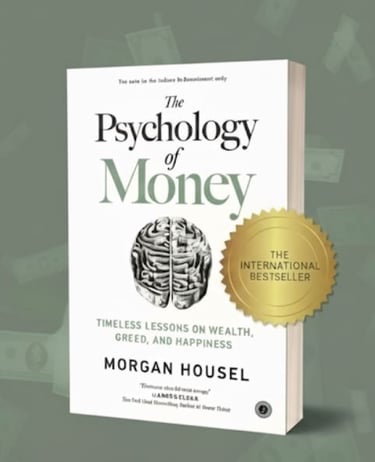Why Your Money Stories Define Your Financial Future: Lessons from The Psychology of Money
COURSES AND E-BOOKS
Have you ever wondered why two people earning the same amount of money make wildly different financial choices? Or why some people feel anxious about investing, while others embrace risk with confidence? The Psychology of Money by Morgan Housel gives us the tools to understand what’s happening behind the scenes—namely, the stories we carry about money from our past, and how those stories shape our beliefs about wealth, risk, and saving.


Your beliefs about money begin forming early—perhaps by observing how your family handled finances, how society talked about wealth when you were growing up, or how scarcity or abundance showed up in your life. These personal history threads silently influence major decisions: whether you save or spend, how much risk you are willing to tolerate, what “enough” means to you. In The Psychology of Money, Housel emphasizes that financial success isn’t so much about knowing the right formulas or having perfect data—it’s about behavior, beliefs, and mindset.
Even very smart people struggle with behavior. In real life, you're not always making financial choices in boardrooms or spreadsheets; you’re making them at your dining table, in conversations influenced by pride or fear, in moments when your ego or your upbringing weighs more heavily than logic. That’s precisely what Housel explores: how our egos, past experiences, marketing messages, and hidden incentives get tangled up and steer our financial lives.
One of the most powerful lessons of The Psychology of Money is that wealth is often invisible. It isn’t always about showing off cars or gadgets—it’s about what you don’t spend, what choices you preserve. Wealth, Housel suggests, is a cushion, flexibility, the ability to make decisions that buy you freedom. Another lesson: knowing when you have “enough.” Because chasing more—more income, more possessions—can lead to risk, regret, or being perpetually unsatisfied.
Throughout The Psychology of Money, Housel shares 19 stories—short, compelling, human—to show how different people view money, risk, success, and happiness. These tales aren’t just theory. They show that growth and saving only matter if the mindset supports them; that consistency matters far more than lucky breaks; and that how you behave with money is what ultimately changes your long‑term outcome.




If you want to build financial confidence, clarity, and peace of mind—not just profits—this book will shift how you see your past, the decisions you make today, and what your financial future can look like. Read The Psychology of Money to discover how your own money story might be your greatest asset.
